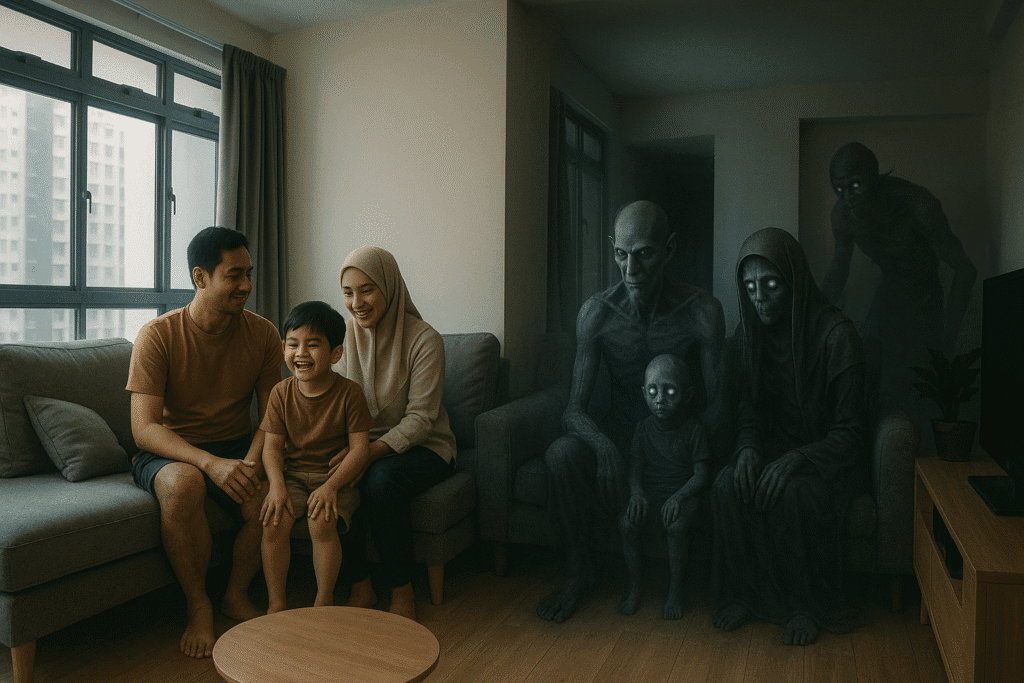How we become the noisy neighbour
Picture four very human scenes.
One. Friends sneak into a deserted house after midnight to film content. They stomp across the floorboards, dare the dark to answer, leave candles smouldering. If strangers did that in your flat, you would not call them explorers. You would call the police.
Two. A late-night kitchen clean-up. A pot of boiling water gets tossed straight into a floor drain or bush outside. We assume the liquid goes to nowhere. But many scholars advise saying bismillah and avoiding scalding water in such places because we do not know who dwells there. The point is not physics. It is adab. YouTube
Three. Rest stops along a dark trail. Someone relieves themselves into a hole because it is convenient. We never see the other side of that act. The hadith told us enough. Sunnah
Four. Party tricks. Boards, chants, symbols, dares. “Show yourself.” From our side it is a thrill. From their side it could be a painful hook that dragged them through a wall.
None of this proves every disturbance is our fault. It does show why many are. Jinn are described as communities with families, movement, loyalty. They react when provoked. Just like us.
We love a good haunting. Old corridors. A cracked window. A dare in the dark. But here is a quieter, more uncomfortable thought. What if most of the time the jinn are not hunting us. We are barging into their space, lighting fires in their rooms, pouring boiling water through their ceiling, yelling for them to show up.
Islam already teaches a kind of spiritual neighbourliness. The Prophet taught us to seek protection before entering places that are unclean or secluded. Before the restroom, we say a short dua asking refuge from male and female devils. This is not superstition. It is etiquette for entering a space we cannot fully map. Sunnah
There is also a clear warning against certain careless habits. The Prophet prohibited urinating into holes in the ground. Early scholars explained one reason given by the narrators themselves — many such cavities are habitats for jinn. It is a simple principle. Do not foul what might be someone else’s home. Sunnah
Time matters too. At the edge of evening when movement blurs and the world tilts, we are told to bring children inside and to shut doors while mentioning the name of Allah. The texts describe that this is when devils spread. The advice is practical, protective, and humbling. There are windows of time that are not for our swagger. Sunnah
And then there are the places the unseen prefer. Classical guidance mentions ruins, dumps, washrooms and lonely corners. In short, the sort of places we treat as nobody’s. Someone might be there. Be slower. Be gentler. Say the name of Allah. Islam
Two real spine-chillers from our backyard
These are not fatwas. They are cautionary stories that locals keep telling because the places still breathe a little heavier than normal.
Story one. Old Changi Hospital, Singapore.
Decades of occupation trauma, abandoned wards, ocean wind, and a reputation that refuses to die. Local journalists joined a night tour and reported how the route is designed to draw you through famous haunted spots, with participants feeling that peculiar tension around the hospital’s shell. Other longform pieces and personal essays describe three straight nights of disturbances during a birthday chalet near the hospital. The details are predictable and still effective. Footsteps where there should be none. A sudden cold pressure on the back of the neck. The hard to explain pull toward the wrong path. Mothership
Story two. Amber Court and the Karak stretch, Malaysia.
Up in Genting Highlands sits Amber Court, a complex so infamous that mainstream travel media now treat it as dark tourism. Visitors describe noises from empty rooms and an atmosphere that feels thick even in daylight. Down the mountain, the Karak Highway has its own catalogue of night stories. Drivers swap accounts of apparitions by the road and the classic figure in white asking for a lift, tied to older Malay lore of the vengeful woman of the night. You do not need to believe every thread to understand the message. Some routes are not ours to swagger through with loud music and full headlights. Business Insider
The Islamic lens that keeps us honest
- Enter with remembrance. Before toilets and other unclean places, recite the taught dua seeking refuge from male and female devils. It is basic spiritual safety. Sunnah
- Avoid known harm. Do not urinate into holes. Do not burn or scald blindly in drains, bushes or lonely corners. If you must pour hot water, say bismillah and pick a place that is plainly safe. Sunnah
- Respect the hour. At the fall of night, bring children in and close doors with the name of Allah. The texts are explicit about this time. Sunnah
- Remember where they dwell. Ruins, refuse, latrines and forgotten edges are not free-for-all. Move as if someone lives there. Because someone might. Islam
Why this perspective matters
We often ask why jinn disturb humans. The harder question is how often we disturb them first. If a neighbour blasted music in your living room, you would react. If boiling water rained through your ceiling, you would rage. The unseen are described as nations like us. When their peace is torn, they answer in their own way. Sometimes with a nudge. Sometimes with a shove.
So the next time you feel a jinn is disturbing someone you know, flip the coin and ask — did we disturb them first?
MORE READS
The Silent Cry of a Dusty Quran in Muslim Homes
Jinns in the Toilet: Please, Let Them Rest!


